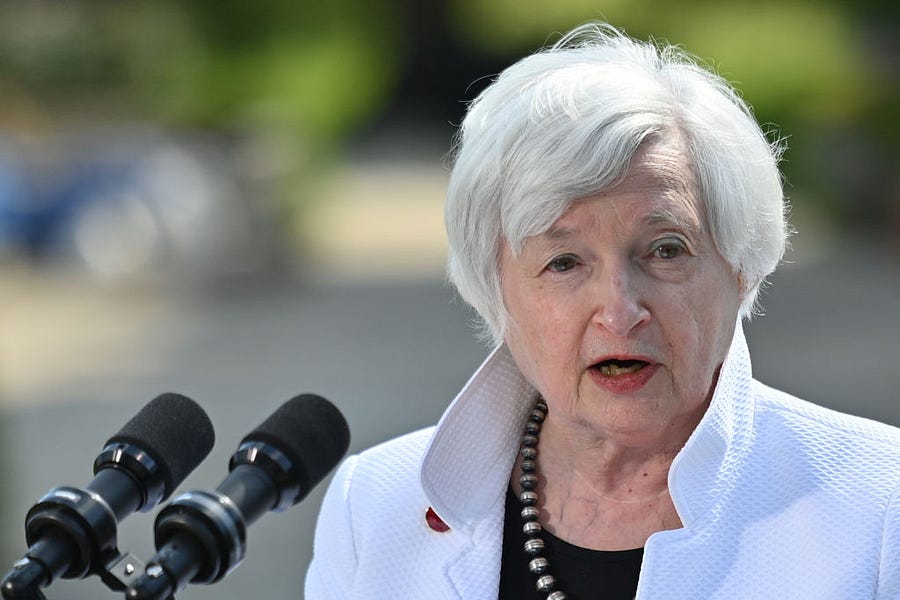After years of trying to agree on how to implement a global minimum tax rate so as to rid the world of tax havens, G7 finance ministers agreed on a plan that aims to do just that earlier this month. Those finance ministers will now take the plan to the G20 meeting scheduled for Rome in July with the ultimate goal of getting all 38 members of the Organization for Economic Co-operation and Development (OECD) on board.
OECD Secretary-General Mathias Cormann praised the plan in a statement the day it was announced, saying, “Today’s consensus among the G7 Finance Ministers, including on a minimum level of global taxation, is a landmark step toward the global consensus necessary to reform the international tax system.”
The G7 plan lays the groundwork for continued talks between countries involved in the OECD/G20 Inclusive Framework, a coalition of more than 135 countries, Thornton Matheson, a senior fellow at the Urban-Brookings Tax Policy Center, told The Dispatch. The goal of the Inclusive Framework is to cut back on the amount of tax avoidance in the world. Established in 2016, the Inclusive Framework has offered rules and regulations for countries to implement in order to cut back on multinational companies avoiding taxes.
One goal of a global minimum tax is to reduce “base erosion and profit sharing,” or BEPS as it’s often referred to. The OECD website describes BEPS as “tax planning strategies used by multinational enterprises that exploit gaps and mismatches in tax rules to avoid paying tax.”
“The OECD is not generally prescriptive when it comes to tax policy,” Matheson said. “The base erosion and profit sharing initiative is new ground for them in this respect, but even there the agenda is largely driven by its member countries, not the organization itself.”
One simple example of BEPS: Company X conducts most of its operations and makes most of its money in the United States, but is headquartered in Dublin, Ireland because Ireland’s corporate tax is so low. There are more complicated examples, one known as the “Double Irish with a Dutch Sandwich” that until it was phased out by Irish law in 2020 allowed companies to use transactions between subsidiaries to transfer money to tax havens. As Investopedia explains:
In 2017, Google reportedly transferred 19.9 billion euros or roughly $22 billion through a Dutch company, which was then forwarded to an Irish company in Bermuda. Companies pay no taxes in Bermuda. In short, Google’s subsidiary in the Netherlands was used to transfer revenue to the Irish subsidiary in Bermuda.
The G7 plan seeks to combat these tax avoidance schemes by establishing a global minimum tax rate of 15 percent and requiring companies to pay (at least) that much tax wherever they operate, not just where they are headquartered.
In the 2017 Tax Cuts and Jobs Act, the U.S. tried to accomplish what the G7 plan is trying to do. While the law reduced overall corporate tax rates, a tax on global intangible low taxed income (GILTI) was implemented with the goal of reducing tax erosion in the U.S. The Tax Policy Center says the GILTI is “the income earned by foreign affiliates of US companies from intangible assets such as patents, trademarks, and copyrights.” However, according to the Tax Foundation, the tax was poorly drafted and companies find themselves paying taxes on more than just the income from those intangible assets.
This tax—which ranges from 10.5 percent to 13.125 percent—was an attempt by lawmakers to keep U.S. businesses from moving offshore, while still bringing in tax revenue to the U.S. The Biden administration is trying to raise that tax to 21 percent.
The road to implementing a broader plan as the G7 envisions is full of zigs, zags, and speed bumps. Whatever plan is decided upon among world finance ministers will still have to be approved by the legislatures of all of those countries.
Let’s start at home in Congress. Democrats, perhaps unsurprisingly, see the plan as a step in the right direction.
Ways & Means Committee Chairman Richard E. Neal (D-Massachuseetts) and Senate Finance Committee Chair Ron Wyden (D-Oregon) released a joint statement when the plan was announced, saying, “This historic consensus by the G7 paves the way for formal agreements to be reached among the participants in the Inclusive Framework negotiations on this matter. We look forward to reviewing the details of today’s deal and applaud the Biden Administration’s leadership in working to level the international playing field and support American workers.”
Meanwhile, many Republican senators The Dispatch spoke to were very skeptical of the whole plan and at minimum wanted more information.
“I don’t know that it’ll really work,” Sen. Josh Hawley told The Dispatch. “So I’m skeptical about it, I’m skeptical about if it’s really enforceable, if it’s really workable.” He added that the goal was a good one and worthy of support.
Sen. Susan Collins told The Dispatch, “Right now it seems to be more a press statement than a real reality.”
“So far as I could tell, it’s not something that many nations have signed up for.” Sen. Mitt Romney told The Dispatch. “Some are saying ‘Hey you guys go first and we’ll see how it works.’ Something of that nature would have to be agreed to by many other nations before it would make any sense. And frankly, I don’t know how it would apply.”
For decades, countries around the world have engaged in a “race to the bottom” on their corporate tax rate. The logic being if a country has lower taxes, more companies would want to operate and invest there.
The corporate tax rate varies significantly around the world, according to Investopedia. There are several countries with a 0 percent corporate tax rate, many of which are in the Caribbean. There are some countries with high corporate tax rates, like Venezuela and Brazil, which both charge 34 percent. The 2017 Tax Cuts and Jobs Act reduced the U.S. corporate tax rate from 35 percent to 21 percent, which the Biden administration has already said it wants to increase. Overall, the global average is 23.79 percent.
What some countries see as an opportunity to increase investment, critics see as allowing companies not to pay their fair share. In a statement announcing the G7 agreement, Treasury Secretary Janet Yellen said, “That global minimum tax would end the race-to-the-bottom in corporate taxation, and ensure fairness for the middle class and working people in the U.S. and around the world.”
Sen. Pat Toomey disagrees, telling The Dispatch, “It’s a very bad idea to be persuading OECD countries to raise their taxes.” He added, “What the secretary thinks is a race to the bottom is, I think, wildly mischaracterizing what’s going on here. Countries that are pursuing economic freedom and prosperity for their people should not be characterized that way.”
According to a Congressional Research Service study that was conducted in 2015, “Of the $1.2 trillion in overseas profits American companies reported earning in 2012, $600 billion was attributed to seven tax havens: Bermuda, Ireland, Luxembourg, the Netherlands, Singapore, Switzerland, and the U.K. Caribbean Islands.”
Some of the countries listed above have already voiced opposition to this plan. Ireland, being one of them, boasts a tax rate of 12.5 percent and has said it will push back against any plans to greatly adjust its tax system.
“It’s been a huge part of our economic model,” Irish Deputy Prime Minister Leo Varadkar, who is also trade minister, told reporters. “Ireland takes in twice as much per head in corporation profit tax in comparison to other countries. It’s a very good example of how low taxes can actually result in higher revenues. We are going to push back very strongly against anything that might jeopardize that.”
Another potential huge roadblock: China. It has been widely reported that the country will ask for carve-outs in whatever plan is agreed upon so the rules wouldn’t apply to companies based in China.
Matheson tells The Dispatch that once the Inclusive Framework comes up with a cogent plan that leaders agree on, the road to implementation is still a long one, “Every single country has to look at this and pass it into law. And that’s going to be a lengthy process and a lot of countries are going to make changes to the blueprint, possibly very big changes.”







Please note that we at The Dispatch hold ourselves, our work, and our commenters to a higher standard than other places on the internet. We welcome comments that foster genuine debate or discussion—including comments critical of us or our work—but responses that include ad hominem attacks on fellow Dispatch members or are intended to stoke fear and anger may be moderated.
With your membership, you only have the ability to comment on The Morning Dispatch articles. Consider upgrading to join the conversation everywhere.